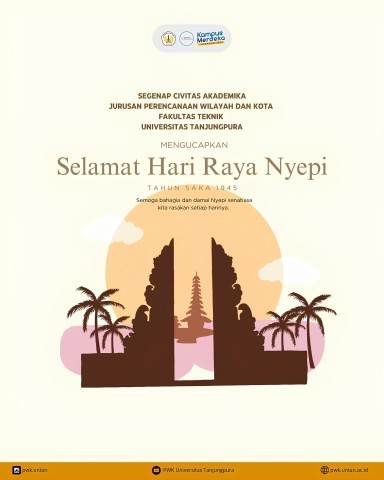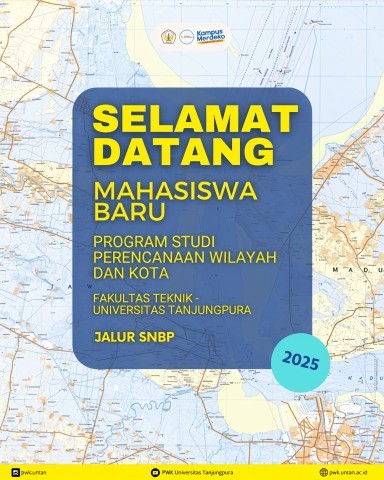
Public Lecture on Optimizing Border Areas as Fast-Growing Areas
On Wednesday, October 9, 2024, a Public Lecture Seminar was held with the theme “Optimizing Border Areas as Fast-Growing Areas:
Sustainable Development Strategy and Connectivity Improvement” which discusses about the optimization of border areas in West Kalimantan as a fast-growing area is an important strategy in sustainable development and as a fast-growing area is an important strategy in sustainable development and increasing connectivity in connectivity in maintaining the stability of the border region. Strategic role in maintaining security, social, and economic stability, while preventing illegal transactions. Development of infrastructure, such as connecting roads and Pos Lintas Batas Negara (PLBN), is prioritized to facilitate border activities and improve welfare prioritized to facilitate border activities and improve the welfare of
community. In addition, the development of new growth centers, downstream industries, green economy, and cross-border tourism are the policy directions economy, and cross-border tourism are the policy directions for the transformation of West Kalimantan until 2045.
until 2045. This activity was attended by students of the Urban and Regional Planning Study Program.
City.
The event was opened by the Master of Ceremony, Trifonia Pisca, by giving a word of remarks as well as the order of the public lecture agenda to the Visiting Professor as a resource person who will provide material at this public lecture, namely Novery Nuzuludin, ST, MT. who is an Intermediate Expert Planner of BAPPEDA of West Kalimantan Province who is an Associate Expert Planner of BAPPEDA West Kalimantan Province. Agenda next agenda was singing the Indonesia Raya song by all participants as a sense of nationalism. Public lecture guided by the conductor. After remarks by the Head of the Department of Urban and Regional Planning. Regional and City Planning Department, Dr. Ir. Erni Yuniarti, ST., Msi. then read out the schedule of the public lecture. Program by the MC then handed over to the moderator to guide the public lecture seminar and the official program began with the reading of the event officially began with the reading of the curriculum vitae by the moderator.
“Optimizing Border Areas as Fast-Growing Areas: Strategies Sustainable Development and Connectivity Improvement”
The initial condition faced by the border is the container/space. Overall the area of West Kalimantan is 2,525,159 Ha. The border with the border area is sub-districts where Putussibau Selatan, Badau, Puring Kencana, Entikong, Paloh Jagoi Babang are border areas. Border areas face problems that need to be considered in the development strategy, such as lowland areas, namely, the coast and the highlands face temperatures such as in Putussibau because there are still many forests that produce enough oxygen. The border region itself must have a Blank Spot which is intended to strengthen the border area and maintain stability. PLBN (Pos Lintas Batas Negara) there are already four established in West Kalimantan, one of which is Jagoi babang, Aruk, Entikong and Badau. Problems faced by the border region border areas is the limited space for human activities in the border areas. activities in it because, the existence of this space is accompanied by the construction of supporting facilities in it.
The policy framework for the development of border areas is strategically oriented to build a leading platform for national integrity and interregional cooperation, which includes strengthening defense through delineation of the nation's territorial borders and enhancement of border area defense and security apparatus. In addition, the initiative seeks to improve the quality of life of border communities by encouraging new growth centers in the region, while maintaining a commitment to environmental sustainability and strengthening governance. An important focus in West Kalimantan is the advancement of infrastructure and human resources, which are considered critical in the development trajectory and prioritized in the border region's development agenda. In accordance with the transformative policy directions for the West Kalimantan region articulated in the RPJPN document for 2025-2045, key initiatives include the establishment of downstream industrial hubs, promotion of green industries, planting the foundations of an innovation-based economy (Bioprospecting), development of an integrated food production system (Food Estate), enhancement of potential tourist destinations (MICE & Cross Border Tourism), optimization of supply chains and provision of talent for future economic demands, smart urban development, widespread electricity initiatives (Isolated Grid), establishment of a digital ecosystem, construction of the Trans Kalimantan toll road, and accelerated provision of critical infrastructure. Under the development theme of West Kalimantan, “Front Veranda State and Green Industry Center of Value Added” these initiatives remain anchored in an overarching strategy for the advancement of the nation's frontier region.



